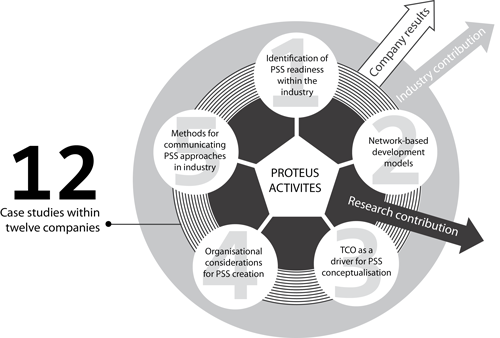PROTEUS was organised into five work packages, seeking to investigate and implement product/service-system strategies at a number of levels in the participating companies.

- PSS readiness and triangulation of companies, industry and market
The first view we took on PSS was to create an understanding of the readiness for a transition towards PSS, of companies, industry and market, with the purpose of establishing the boundary conditions for PSS, and to frame subsequent PSS strategies. By establishing the boundary conditions for PSS in the particular industrial context, it was possible to identify a set of questions to guide the research process within the industry. PSS strategies were of particular interest, both to the participating companies and as an object for observation, from a cross-company viewpoint. With this view we identified a series of PSS readiness aspects, which helped to assess PSS readiness in the branch and in individual organisations.
- Value chain collaboration
The second view we took on PSS focused our attention towards a new understanding of value creation, where the combination of product and service were seen as a system, contributing with a combined value proposition, by sustaining and enhancing the utility of the offering through the whole product/service life cycle. In this view the value creation process is prioritised to be the main parameter of customer satisfaction, in place of just product quality.
Within the PSS conceptualisation activity a proactive approach towards creating value chain collaboration was one of the elements investigated within PROTEUS. One of the hypotheses for this view on PSS was that the competitiveness of PSS offerings will increase when the significant stakeholders from the value chain or potential new value contributors are identified and involved in the co-development of the offering.
- Total Cost of Ownership & PSS conceptualisation
Total Cost of Ownership (TCO) is a concept whereby the economical costs occurred throughout the whole life cycle of a product or system are considered up-front, as opposed to e.g. first purchase cost. TCO has been studied within the PSS field before, where the lack of ability or willingness of customers to think in terms of TCO has been found to be a significant barrier for PSS implementation in a business-to-business setting. By adjusting the focus away from first purchase cost to the total cost of ownership, new business ideas and product/service solutions can arise that not only satisfy the customer but also create a so-called customer lock-on; the achievement of continued/prolonged relationships between company and customer.
In the maritime industry we observed a new tendency for the customer (the shipowner) to move towards TCO as a concept when procuring ships. This tendency gives a great opportunity for the component supplier companies to create and present integrated product/service offerings to the shipowners. The main questions that were explored in this third view on PSS were therefore: How to utilise TCO as a driver for PSS concept creation? How to go about PSS conceptualisation, given that the customer is willing and able to operate their products on a TCO basis?
- Organising for PSS
The fourth PSS view we took for this project concentrated on the tasks of product development organisation for PSS and PSS organisation in the company. The hypothesis was that for a successful shift in focus from technology/artefact-based business creation over to service-oriented business creation will demand a redefinition of tasks within the organisation, as well as a re-evaluation of competencies inherent in the company and competencies needed, together with a re-definition of the organisation- and management structure in the company. The research in this work package focused on how to enable companies to efficiently integrate service performance into their product and business development processes, including an understanding of the types of changes that this causes on an organisational/management level.
- Implementing change in the product development process
In order for intended changes to take effect in real-life contexts, it is necessary to focus on implementation in the daily routines of the involved organisations. Especially this aspect, however, had not been found to be fully successful in PSS projects we had reviewed before starting PROTEUS, since actual up-and-running industry cases were very sparse, let alone PSS cases for an entire industry branch. We therefore took a fifth view on PSS, specifically focused on how to effectively and systematically integrate service development into product development and business creation processes.
From a research perspective, we identified two key tasks: firstly, the development of measurable parameters to control and monitor PSS processes; and secondly the development of methods to disseminate such parameters and related experience within the industry.
From an industrial perspective, we saw the actual dissemination of the above methods and experience as being the main challenge for the project. This task was therefore led by one dedicated consortium partner, with great experience in transferring research-based knowledge into industrial innovation. Dissemination activities comprise, for instance, of freely accessible information on a dedicated partner homepage, general as well as tailor-made workshops, a toolbox of methods and printed media such as the handbooks and executive reports you can find on this website.
With the entire industry represented through the case companies and their branch organisation, the PROTEUS project created not-seen-before preconditions to capture and facilitate experience exchange amongst and within the involved industrial companies and organisations regarding PSS development, PSS implementation and PSS operation.